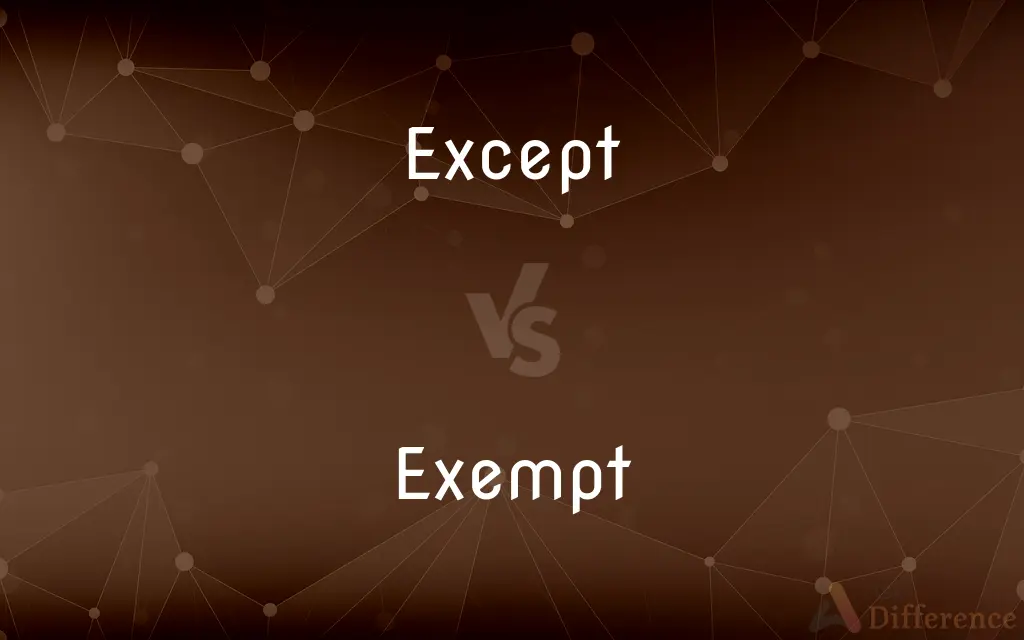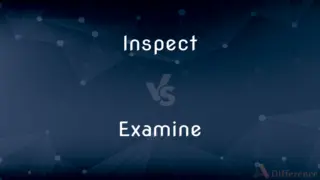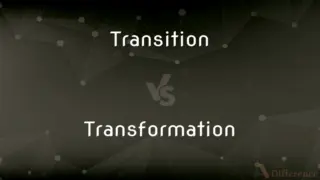Except vs. Exempt — What's the Difference?
By Fiza Rafique & Maham Liaqat — Updated on April 17, 2024
"Except" is used to exclude something from a statement, while "exempt" means to free someone or something from a liability or obligation.

Difference Between Except and Exempt
Table of Contents
ADVERTISEMENT
Key Differences
"Except" functions primarily as a preposition or a conjunction in sentences, indicating the exclusion of an item or fact from a general statement. For instance, "All students, except John, passed the exam." On the other hand, "exempt" is used as a verb or an adjective, referring to the act of freeing someone or something from a given responsibility or rule, such as in "Small businesses are exempt from this regulation."
The usage of "except" implies the presence of an exception to a rule or a statement, thereby narrowing down inclusivity. Whereas, "exempt" suggests a privilege or a relief from usual requirements, often granted by law or authority, emphasizing a special status.
While "except" is commonly used to introduce exceptions in both formal and informal contexts, making it a versatile part of everyday language, "exempt" is typically found in more formal, legal, or bureaucratic contexts, indicating its specialized use.
"Except" can be followed by various grammatical structures, including nouns, pronouns, or verb phrases, adjusting the context of a statement. In contrast, "exempt" is usually followed by the prepositions "from" or "by," which help define what the exemption pertains to or who authorizes it.
"Except" does not imply any legal authority or formal exemption, and is more about specifying limitations or conditions in discourse. On the other hand, "exempt" often carries legal implications, providing specific entities or individuals relief from obligations such as taxes, duties, or formal rules.
ADVERTISEMENT
Comparison Chart
Part of Speech
Preposition, Conjunction
Verb, Adjective
Usage Context
General language, versatile
Formal, legal, specific
Grammar Structure
Followed by nouns, pronouns, verbs
Usually follows "from" or "by"
Implication
Indicates exclusion
Indicates privilege or relief
Legal Connotation
None
Often associated with legal exemptions
Compare with Definitions
Except
To exclude something or someone from a statement.
Everyone went to the movie except Sam.
Exempt
To free from an obligation.
The charity is exempt from paying taxes.
Except
Can introduce a contrasting part of a sentence.
The trip was enjoyable, except for the weather.
Exempt
Used as an adjective to describe being free from an obligation.
She is exempt from the final exam due to her high grades.
Except
Used to specify a condition.
She would travel except that she doesn’t have enough money.
Exempt
In legal contexts, refers to specific exemptions granted by law.
Certain goods are exempt from import duties.
Except
Often appears in lists to highlight non-inclusion.
All fruits are allowed on the diet except bananas.
Exempt
Often requires formal authorization or conditions.
Employees are exempt from overtime under certain conditions.
Except
Functions in various grammatical roles, including as a conjunction.
He would have helped, except he was too busy.
Exempt
Relates to privileges or exceptions granted by authorities.
Diplomats are exempt from parking fines.
Except
Not including; other than
They work every day except Sunday
I was naked except for my socks
Exempt
Free from an obligation or liability imposed on others
A tax-exempt savings plan
These patients are exempt from all charges
Except
Used before a statement that forms an exception to one just made
I didn't tell him anything, except that I needed the money
Our berets were the same except mine was blue
Exempt
Free (a person or organization) from an obligation or liability imposed on others
They were exempted from paying the tax
Except
Specify as excluded from a category or group
Five classes of advertisement are excepted from control
Exempt
A person who is exempt from something, especially the payment of tax.
Except
With the exclusion of; other than; but
Everyone except me.
Exempt
To free from an obligation, duty, or liability to which others are subject
Exempting the disabled from military service.
Except
If it were not for the fact that; only. Often used with that
I would buy the suit, except that it costs too much.
Exempt
(Obsolete) To set apart; isolate.
Except
Otherwise than
They didn't open their mouths except to complain.
Exempt
Freed from an obligation, duty, or liability to which others are subject; excused
Persons exempt from jury duty.
Income exempt from taxation.
A beauty somehow exempt from the aging process.
Except
(Archaic) Unless
"And ne'er throughout the year to church thou go'st / Except it be to pray against thy foes" (Shakespeare).
Exempt
Not subject to certain federal workplace laws or protections, especially those requiring overtime compensation
Exempt employees.
Except
To leave out; exclude
An admission fee is charged, but children are excepted.
Exempt
(Obsolete) Set apart; isolated.
Except
To object
Counsel excepted to the court's ruling.
Exempt
One who is exempted from an obligation, duty, or liability.
Except
(transitive) To exclude; to specify as being an exception.
Exempt
Free from a duty or obligation.
In their country all women are exempt from military service.
His income is so small that it is exempt from tax.
Except
(intransitive) To take exception, to object (to or against).
To except to a witness or his testimony
Exempt
(of an employee or his position) Not entitled to overtime pay when working overtime.
Except
With the exception of; but.
There was nothing in the cupboard except a tin of beans.
Exempt
(obsolete) Cut off; set apart.
Except
With the exception (that); used to introduce a clause, phrase or adverb forming an exception or qualification to something previously stated.
You look a bit like my sister, except she has longer hair.
I never made fun of her except teasingly.
Exempt
(obsolete) Extraordinary; exceptional.
Except
(archaic) Unless; used to introduce a hypothetical case in which an exception may exist.
Exempt
One who has been released from something.
Except
To take or leave out (anything) from a number or a whole as not belonging to it; to exclude; to omit.
Who never touchedThe excepted tree.
Wherein (if we only except the unfitness of the judge) all other things concurred.
Exempt
(historical) A type of French police officer.
Except
To object to; to protest against.
Exempt
(UK) One of four officers of the Yeomen of the Royal Guard, having the rank of corporal; an exon.
Except
To take exception; to object; - usually followed by to, sometimes by against; as, to except to a witness or his testimony.
Except thou wilt except against my love.
Exempt
(transitive) To grant (someone) freedom or immunity from.
Citizens over 45 years of age were exempted from military service.
Except
With exclusion of; leaving or left out; excepting.
God and his Son except,Created thing naught valued he nor . . . shunned.
Exempt
Cut off; set apart.
Corrupted, and exempt from ancient gentry.
Except
Unless; if it be not so that.
And he said, I will not let thee go, except thou bless me.
But yesterday you never opened lip,Except, indeed, to drink.
Exempt
Extraordinary; exceptional.
Except
Take exception to;
He demurred at my suggestion to work on Saturday
Exempt
Free, or released, from some liability to which others are subject; excepted from the operation or burden of some law; released; free; clear; privileged; - (with from): not subject to; not liable to; as, goods exempt from execution; a person exempt from jury service.
True nobility is exempt from fear.
T is laid on all, not any one exempt.
Except
Prevent from being included or considered or accepted;
The bad results were excluded from the report
Leave off the top piece
Exempt
One exempted or freed from duty; one not subject.
Exempt
One of four officers of the Yeomen of the Royal Guard, having the rank of corporal; an Exon.
Exempt
To remove; to set apart.
Exempt
To release or deliver from some liability which others are subject to; to except or excuse from he operation of a law; to grant immunity to; to free from obligation; to release; as, to exempt from military duty, or from jury service; to exempt from fear or pain.
DeathSo snatched will not exempt us from the painWe are by doom to pay.
Exempt
Grant relief or an exemption from a rule or requirement to;
She exempted me from the exam
Exempt
Grant exemption or release to;
Please excuse me from this class
Exempt
(of persons) freed from or not subject to an obligation or liability (as e.g. taxes) to which others or other things are subject;
A beauty somehow exempt from the aging process
Exempt from jury duty
Only the very poorest citizens should be exempt from income taxes
Exempt
(of goods or funds) not subject to taxation;
The funds of nonprofit organizations are nontaxable
Income exempt from taxation
Common Curiosities
What does "exempt" mean?
"Exempt" means to free someone or something from an obligation, duty, or requirement.
How do I use "except" in a sentence?
Use "except" to indicate an exclusion, such as "Everyone was invited except Jane."
What does "except" mean?
"Except" means to exclude one or more items from a general statement or group.
Is "exempt" always formal?
Yes, "exempt" generally appears in more formal, legal, or specific contexts compared to "except."
Can "exempt" be used for any obligation?
"Exempt" is often used in specific contexts, usually legal or formal, to indicate freedom from particular obligations.
Who can declare someone or something exempt?
Authorities, governments, or specific regulations usually declare exemptions.
Is "exempt" related to specific laws or rules?
Yes, "exempt" often relates to exemptions provided under specific laws or rules.
How do I use "exempt" in a sentence?
Use "exempt" as a verb or adjective, such as "They are exempt from the fee" or "The law exempts them from paying."
Can "except" have a legal implication?
Typically, "except" is used more broadly and does not carry legal weight.
Is "except" used in everyday conversation?
Yes, "except" is common in both spoken and written English, across informal and formal settings.
How do "except" and "exempt" differ in terms of authority?
"Exempt" often involves authority or formal decision-making, whereas "except" does not involve authority and is used more generally to denote exclusions.
Can organizations be exempt from taxes?
Yes, certain organizations, like charities, can be exempt from taxes under specific legal conditions.
What is the difference in application between "except" and "exempt"?
"Except" is more versatile, used in various contexts to indicate exclusion, while "exempt" is more specialized, often used in formal or legal contexts.
What prepositions are commonly used with "exempt"?
"From" and "by" are commonly used with "exempt," as in "exempt from" or "exempt by law."
Can "except" introduce a clause?
Yes, "except" can introduce clauses, particularly when functioning as a conjunction.
Share Your Discovery

Previous Comparison
Inspect vs. Examine
Next Comparison
Transition vs. TransformationAuthor Spotlight
Written by
Fiza RafiqueFiza Rafique is a skilled content writer at AskDifference.com, where she meticulously refines and enhances written pieces. Drawing from her vast editorial expertise, Fiza ensures clarity, accuracy, and precision in every article. Passionate about language, she continually seeks to elevate the quality of content for readers worldwide.
Co-written by
Maham Liaqat















































